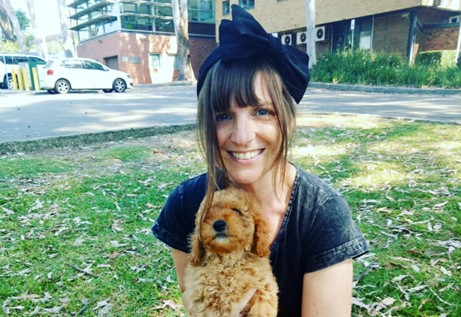“You have a massa growth of cells that come together to make a lump, may or may not be cancer the size of a mango near your appendix.” This is news Megan, 38 at the time, was delivered by her GP in early 2019.
The mother of three underwent emergency surgerytreatment involving removal of cancerous tissue and/or tumours and a margin of healthy tissue around it to reduce recurrence to remove the mass, along with a large section of her colonthe longest portion of the large bowel that absorbs water and salts from ingested food, which she says left the surgeon ‘flabbergasted’.
“The tumoura tissue mass that forms from groups of unhealthy cells was a mix of cellsthe basic structural and functional unit of all living things, including ovarian stroma, and certainly found nowhere near my ovaries. It took two weeks for pathologythe study of disease to report back with even a description of what they saw under the microscope; they had no name for it.
“I was told I had a rare malignancy, with only two or three documented cases in the world. The other case reports were done on autopsies, so my prognosisto predict how a disease/condition may progress and what the outcome might be was not good. It seemed my fate was already decided,” she said.
Megan says treatment was ‘a stab in the dark’. She completed chemotherapya cancer treatment that uses drugs to kill or slow the growth of cancer cells, while minimising damage to healthy cells for six months, but the cancera disease where abnormal cells split without control and spread to other nearby body tissue and/or organs continued to grow at a rate of 8cm every three months. It grew back but this time in her liver, so she had a second surgery to remove half of her liver, plus her gallbladder and affected lymph nodessmall bean-shaped structures that filters harmful substances from lymph fluid.
“My body felt so broken, but I would not let it affect my spirit. While each breath was painful, I focused on the fact that I had breath and the will to fight for more and more,” Megan remembers.
Unfortunately, the cancer grew back again at an aggressive rate, and within weeks of her surgery a PET scan confirmed her liver was riddled with cancer, along with growth in her lung and rib.
“The oncologista doctor who specialises in the study, diagnosis and treatment of cancer said there was nothing else to be done. We knew I wouldn’t see the end of the year. I wasn’t afraid of dying, but I was afraid of what that would do to my children and my husband. I was even more determined to turn over every stone for a chance to survive.”
During their journey, Megan’s husband, a professor in microbiology, insisted she have gene profiling done on her tumour.
“He spent day and night researching journal articles and clinical trialsresearch studies performed to test new treatments, tests or procedures and evaluate their effectiveness on various diseases. When all hope was lost, the results from my profiling finally returned and we found a trial that matched some of my mutations. I was fortunate to get in before covid lockdown, as they shut down acceptance the following week.”
The trial was rough on Megan, and she had numerous hospitalizations before a manageable dosage was set.
“When I got the results of my first scan, it already showed my tumours were shrinking and appeared to be liquifying. After six months, no tumours could be seen on my scans.”
Megan continued for another year and a half until the trial company granted her permission to come off with the ability to resume if the cancer reappeared.
“I’ve been off treatment now for three months and I finally feel like I’m getting a semblance of my life back. My three beautiful children have their energetic mum again, and my husband – who I know saved me – can see a future with his wife. We never know what each scan holds so we cherish the moments we have been gifted.
“Cancer is an awful disease, and the journey is an emotional rollercoaster. But it also gave me the gift to find gratitude in all things and cherish each breath. The sun has never shined brighter, and I appreciate each raindrop on my face.
“I refuse to allow it to be purposeless, which is why my husband and I share our story to inspire and empower others. We advocate for gene profiling and molecular screeningtesting for cancer or conditions that can lead to cancer before symptoms appear, also known as cancer screening, which saves lives.”
“We’ve met with many people who have heard of our journey and are desperate for the same hope. There might be options out there that you never expected to find, and people who can help you look for them. Never give up.”
For more information on genetic testinga procedure that analyses DNA to identify changes in genes, chromosomes and proteins, which can be used to analyse tumour DNA to help determine which treatment has the greatest chance of success, contact a Specialist Cancer Navigator on 1800 257 600 or email [email protected]
